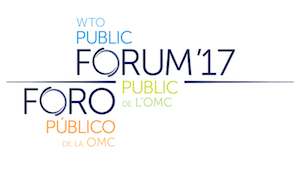Domestic regulation, trade in services, jobs, and digitalization: challenges and opportunities
27 Sep 2017 17:00h - 18:30h
Event report
[Read more session reports from WTO Public Forum 2017]
Ms Deborah James, Director of International Programs, Centre for Economic and Policy Research (CEPR), moderated the session. She explained that the organisation has been fighting for transparency on trade, and against the expansion of the WTO’s mandate on some new topics.
Ms Sanya Reid Smith, Legal advisor and Senior researcher, Third World Network, explained that domestic regulations are present at the WTO and in regional trade agreements. They do not apply only in the national sphere, but also on the sub-national level. According to the General Agreement on Trade in Services (GATS), ‘Each Contracting Party … shall take such reasonable measures as may be available to it to ensure observance by regional and local governments and authorities’.
The most common understanding is that these rules would apply only to service sectors that have been liberalised, but some believe it could apply to non-liberalised sectors too, such as education, health, and water. These provisions would apply in three areas:
- Qualifications requirements and procedures. For instance, it would apply to requirements to exercise some professions, such as medicine.
- Licensing and procedure for opening some types of businesses. They would regulate, for instance, whether an environmental impact assessment could be requested or not, before opening a mining place.
- Technical standards that would indicate compliance with licenses that have been received.
Domestic regulation would require some characteristics that aim to define it, but that are in fact, very vague, such as to be objective, transparent, and not excessively burdensome. Some countries, such as the United States, Canada, and Brazil, have expressed their concerns over the ’necessity’ test, because it could be open to interpretation.
Mr Fernando Rosales Lozada, Minister Counsellor, Mission of Bolivia to the WTO evaluates that domestic regulation applies to measures related to services, so they would expand the reach of GATS beyond its initial remit, thus undermining states’ capacity to regulate. Rosales Lozada believes that this kind of agreement will not help countries to achieve sustainable development goals, because developing countries need space to regulate and develop public policies. Domestic regulations hinder their ability to do so.
Mr Helmut Scholz, Member of European Parliament, MEP, European Parliament, explained that the parliament is co-legislator in concluding international trade agreements. So far, the parliament has not been asked to evaluate the issue of domestic regulations. The issue is being discussed by the European Commission on behalf of the EU countries, and the parliament comes in towards the end of the negotiation process. There is a possibility to consult the parliament at the present stage, but this is non-mandatory. Scholz said that he is against negotiations behind closed doors, and believes that the issue should be tabled frankly.
Ms Michael Wamai, Counsellor, Mission of Uganda to the WTO, affirmed that domestic regulations apply across the board to all domestic activities. They can spill over to other sectors that merely affect trade. They are highly intrusive in the domestic domain of states and would hinder the possibility to pursue some public policy objectives. African countries and Least Developed Countries need to regulate services reflecting the national interest. Moreover, domestic regulations shift the burden of proof: governments would need to demonstrate that the policy they plan to approve is necessary to achieve a public policy objective and that this policy was the less burdensome option. Finally, they would apply not only to future norms, but also to those currently in place.
by Marilia Maciel
Related topics
Related event

